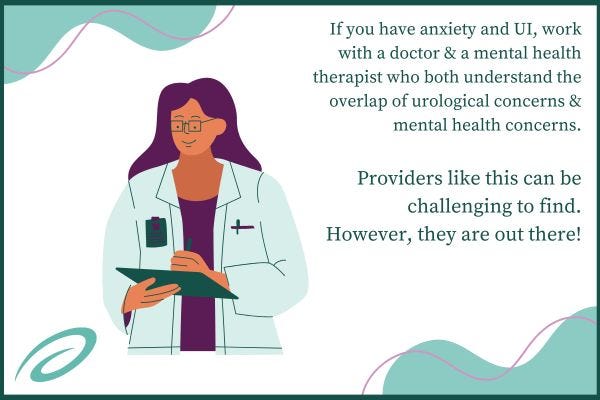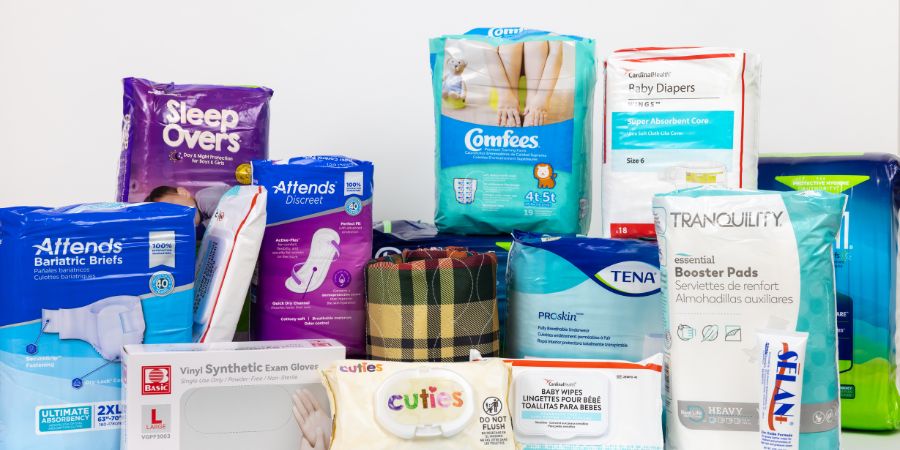Key Takeaways:
- Anxiety aggravates urinary incontinence by increasing pelvic muscle tension, leading to urinary urgency and leakage.
- Effective management requires addressing anxiety alongside urinary issues through therapy, medication, and lifestyle adjustments.

Anxiety is the most common mental illness in the United States, affecting over 30% of adults nationwide.
This condition leads to side effects like panic attacks, depression, and many other emotional and physical symptoms that can take a severe toll on your quality of life.
Anxiety can also cause bladder problems, and bladder problems can lead to anxiety. This vicious cycle can be challenging to deal with, but with the help of our Medical Advisor, Aleece Fosnight, you can manage and resolve your symptoms.
Jump To:
Can Anxiety Cause Urinary Incontinence?
How to Treat Anxiety & Urinary Incontinence
How to Get Bladder Control Products Through Insurance
INCONTINENCE PRODUCTS THROUGH INSURANCE:
Aeroflow Urology is in-network with many Medicaid and Medicaid-managed insurance plans and is accredited by Medicaid. Complete our Eligibility Form, and we’ll automatically check to see if your plan covers incontinence supplies. ***Must meet certain requirements to qualify.***
You will also receive the care and attention every person managing incontinence deserves: A personalized list of 100% insurance-covered incontinence supplies, a dedicated Continence Care Specialist you can contact during business hours, a user-friendly online portal for easy monthly reordering, and educational content.
Get the continence care you need with the dignity you deserve. Join the Aeroflow Urology family today! It only takes 2 minutes to get started.
Check Your Eligibility
2 Easy Steps
Discover the continence care essentials available through your Medicaid plan.
Can Anxiety Cause Urinary Incontinence?
Anxiety is often a contributing factor to urinary incontinence (UI) (loss of bladder control resulting in urinary leakage). Several studies have shown anxiety to be linked to over 50% of people experiencing UI.
When you have anxiety, you go into a “fight or flight response.” This stress response affects your sympathetic nervous system, increasing muscle tension throughout the body, including in the pelvic floor muscles (the muscles that hold up your bladder and other organs). All of this increased pelvic floor muscle tension places extra pressure on your bladder, leading to UI.
Urge Incontinence
Anxiety can also cause you to hold your breath or decrease your breathing, both of which limit the mobility of your diaphragm. This causes the pelvic floor muscles to engage and elevate, leading to increased pressure in the pelvis and pelvic organs, like the bladder.
These physiological side effects of anxiety can lead to UI— specifically, urinary urgency and urge incontinence. The main symptom of urinary urgency and urge incontinence is feeling the sudden and intense urge to void your bladder, which often results in leakage.
Stress Urinary Incontinence
While urinary urgency and urge incontinence are the most common types of UI related to anxiety, prolonged anxiety can weaken your pelvic floor muscles over time, leading to urination problems.
Because weak pelvic floor muscles cannot support pelvic pressure when increased abdominal pressure is placed on the pelvis, the muscles are not able to support the urethra, allowing urine leakage. This leads to stress urinary incontinence, which symptoms include leaking urine when coughing, sneezing, bending over, lifting heavy objects, or exercising.
Anxiety can cause UI, and it can also exacerbate existing incontinence symptoms. The more tension the pelvic floor muscles have on them, the more these overlapping urinary symptoms will occur.
Anxiety and urinary incontinence will continue to perpetuate one another. If you have anxiety, you may develop urinary incontinence, and then the urinary incontinence will increase your anxiety, leading to a vicious cycle, worsening both the anxiety and the incontinence.
How to Treat Anxiety & Urinary Incontinence
Treating anxiety can be a long-term task, but with the proper resources, there is hope! In the meantime, directly treating symptoms of UI can be simple with the help of a healthcare professional.
1. Speak With a Healthcare Professional
It is essential to treat the root cause of your UI (anxiety and stress), which is why it is so important to seek medical advice from your provider (physician, psychologist, therapist, etc.) about your mental health anytime you have concerns with your mental health or UI.
If you have anxiety and UI, work with a healthcare provider and a mental health therapist who both understand urological concerns and the overlap of mental health concerns. Providers like this can be challenging to find. However, they are out there!
If you experience anxiety when leaving your home, you may be able to schedule a telehealth visit with your provider.
Cognitive behavioral therapy (CBT) and dialectical behavioral therapy (DBT) can be beneficial for anxiety. However, everyone’s needs are unique, and finding the right therapy is vital to assessing and managing your anxiety.
2. Use Relaxation Techniques
There are certain coping strategies you can try that will help you manage both symptoms of anxiety and UI simultaneously.


- Belly breathing: Belly (diaphragmatic) breathing can be beneficial. By engaging the diaphragm with deep breathing, the vagus nerve (one of the most powerful parasympathetic nervous system nerves) turns on. This can decrease your feelings of anxiety. Belly breathing also relieves the pelvic floor muscles of tension, releasing extra tension on the bladder.
- Meditation: Mindfulness and meditation can be very effective therapies in decreasing anxiety and, therefore, decreasing UI. Mindfulness has been shown to help reduce the stressors of anxiety, allowing you to become aware of the present moment and eliminating the effects of the stressors on the body. Mindfulness addresses anxiety as a trigger for urinary incontinence.
- Yoga: Yoga can incorporate pelvic floor exercises with deep breathing, which is great for relaxation and your pelvic health.
3. See a Pelvic Floor Physical Therapist
Sometimes, the pelvic floor muscles will not relax despite anxiety coping strategies. In these situations, seeking the help of a pelvic floor physical therapist can be very useful to help decrease UI symptoms.
4. Make Lifestyle Adjustments
Simple lifestyle adjustments can help decrease your UI symptoms, such as:
- Increasing water consumption.
- Increasing fiber intake.
- Avoid constipation.
- Decreasing bladder irritant foods / beverages.
- Increasing sleep.
5. Explore Medication-Based Treatments
There are several medications used to treat anxiety. Most of these medications don’t also treat UI at the same time.


However, a medication called Duloxetine (commonly known as Cymbalta) is an SNRI that has been shown to help decrease pelvic floor and bladder muscle tension, aiding in the treatment of urge incontinence.
6. Wear Bladder Control Products
Highly absorbent adult briefs, adult pull-ons, and bladder control pads can help you discreetly manage your urinary symptoms, which can reduce any anxiety that may be developing from leaving your home out of fear of having accidents in public.
If your healthcare provider has diagnosed you with anxiety-related urinary incontinence, you may qualify to receive free bladder control products with Aeroflow Urology!
The best part is that once you’re a patient of Aeroflow, we’ll send you free monthly shipments of incontinence products in unmarked boxes, so you won’t need to leave home. Your supplies will continue to be free every month as long as you have an updated prescription from your healthcare provider.
Submit our Eligibility Form to start receiving your free products if you qualify.
Remember that it is not normal to have UI. Seeking a medical professional can help to isolate the cause and offer solutions to improve your quality of life. No one should have to suffer in silence. It may not be easy to speak up, but try to find a provider who will listen to your concerns and offer suggestions for treatment options.
Call and talk to the front office at a healthcare provider’s office. They will know if the provider you’re seeking treatment from takes time with their patients and listens. There is hope!
References:
Booth, J. (2023, October 19). Anxiety Statistics And Facts. Forbes Health. https://www.forbes.com/health/mind/anxiety-statistics/#:~:text=Nationally%3A%20Over%2040%20million%20adults
Disclaimer
Information provided on the Aeroflow Urology blog is not intended as a substitute for medical advice or care from a healthcare professional. Aeroflow recommends consulting your healthcare provider if you are experiencing medical issues relating to incontinence.












